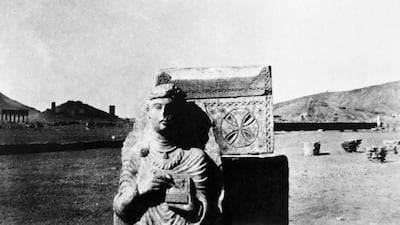‘Did I tell you I was writing a travel book?,” Gertrude Bell wrote to Valentine Chirol in 1905. “Well I am. It’s the greatest fun… It’s Syria from underneath, what they think of it, the talk I hear round my camp fires, the tales they tell me as they ride with me, the gossip of the bazaar.”
Bell was the 36-year-old daughter of a northern British industrialist, Sir Hugh Bell, who had recently inherited £750,000, the equivalent of $120m today. Chirol was the head of the foreign department at The Times, London. Published in 1907, The Desert and the Sown proved to be rather more than "the greatest fun" Enid Blyton romp suggested in her high-spirited correspondence. It was an instant classic of travel writing, a book that remains loved and enduringly relevant more than a century later.
The book takes its title from that “delectable region” referred to by the 11th century Persian poet, philosopher and mathematician Omar Khayyam, “the strip of herbage strown / That just divides the desert from the sown”. The opening lines set the tone for a remarkable book of personal discovery, political history and highly-charged adventure in Syria and Palestine.
“To those bred under an elaborate social order few such moments of exhilaration can come as that which stands at the threshold of wild travel. The gates of the enclosed garden are thrown open, the chain at the entrance of the sanctuary is lowered, with a wary glance to right and left you step forth and behold! the immeasurable world.”
Bell’s wanderings begin in Jerusalem and take her to Jericho and Amman before heading north around the Jebel Druze to the Syrian capital of Damascus. Then it is onwards to Homs, one-time cradle of today’s revolution against the Assad regime, Hama, ancient Aleppo and Antioch, finishing at Alexandretta, the Turkish port of Iskenderun. Evocative scenes come thick and fast. Here is the Dome of the Rock, the stretching shores of the Dead Sea, the Castle of Salkhad and the “magnificent monuments” of Kanawat; these images and many more recorded in Bell’s handsome black and white photographs.
Like all good travellers she is highly perceptive, an acute observer and listener to those she meets. A snob in her British official life, Bell had a penchant for the aristocrats of the Arab world, be they political grandees or desert sheikhs. Yet one of the many strengths of The Desert and the Sown is her writing about the "conditions of unimportant persons" who justify their place in her prose because "they do not appear so unimportant to one who is in their midst".
She gets out of Syria’s salons, into the desert and under the skin of its people. Talking of the desert, to wake in it at dawn is to “awake in the heart of an opal”.
Reading her more than a century later, there are so many irresistible parallels – by turns tragic, political, whimsical and amusing – it is difficult to know where to begin. Writing in the dying days of the Ottoman Empire, a decade before the Sykes-Picot Agreement redrew the Middle East, a century before the ill-fated Arab Spring, she observes that “Islam is the bond that unites the western and central parts of the continent, as it is the electric current by which the transmission of sentiment is effected, and its potency is increased by the fact that there is little or no sense of territorial nationality to counterbalance it.”
She finds the British guilty of “perfidious” dealings with Constantinople. A faithful imperial servant to the core, she believes the English were the best placed to have “taken Syria in hand”.
Bell’s voice is always unmistakable. She writes con brio, her literary force and vigour a fascinating counterpoint to her physical toughness. This was a woman determined to succeed in what was then almost an exclusively male public life.
At one level she was a trailblazing feminist: the first woman to achieve a first degree in modern history at Oxford, the first to be awarded a prize by the Royal Geographical Society and the first female officer in British military intelligence. As a mountaineer she made a dangerous and important first ascent in the Alps. As a multilingual government official she became co-architect and kingmaker of modern Iraq. Yet paradoxically she was also a fierce opponent of the Suffragettes movement and the extension of the vote to women.
In its 1926 obituary The Times hailed Bell as "a great Englishwoman". The late Arabian explorer Wilfred Thesiger, who was something of a misogynist, agreed in an unequivocal verdict: "If any one woman was to be thought of as a serious traveller, it had to be Gertrude Bell."
Justin Marozzi is a freelance journalist and the author of Baghdad: City of Peace, City of Blood, winner of the 2015 Ondaatje Prize.


